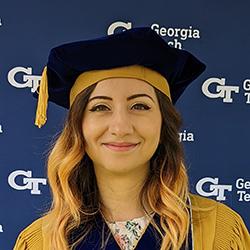
Ruxandra Duca
What is your next adventure?
In June I will start my first full-time job as a systems engineer for Wisk Arrow. They are a company located in Mountain View, California that specialize in small, electrical aircraft that can take off and land vertically which alleviates urban congestion, traffic, and reduce emissions.
What about your next adventure are you most looking forward to?
I’ve learned design methods and systems engineering methods during my time at Georgia Tech, so I'm excited to apply them in this field of electric vertical take-off and landing (eVTOL). It’s kind of new to me, I'm definitely excited about the field, but I haven't worked with it extensively. I think urban air mobility and electrical small aircraft are some of the next big things to take off in the industry, so it’s definitely an exciting time to start working at Wisk Arrow.
Did you have any previous co-op, internship, or research experience in this area?
As part of my research, I have worked a lot with methods for model-based systems engineering (MBSE), which I will be doing primarily in my new role. As a grad student, I spent five years on a project with Airbus on model-based systems engineering where we looked at the industrial challenges that they had in terms of their aircraft design process and their current models to provide methods to more systematically explore new aircraft architectures without introducing any errors. Through that experience I also pursued a master’s in computation science and engineering (CSE) and carried over some methods into my thesis, so it was a nice area for exploration.
How did your educational experience at Georgia Tech help you to achieve your goals?
I think we have a really interesting program specifically in the Aerospace Systems Design Lab (ASDL), where we do a lot of work and collaboration with industry. I mentioned Airbus earlier, but I've also worked with Gulfstream during my first couple of years here. We really collaborate with their engineers, we get to see the kinds of challenges that they have in the industry and in the company, the kinds of questions they ask, so it really helped me learn a lot more than just through pure academic research and going to classes.
Professor Dimitri Mavris and my coursework really opened my eyes to how aircraft design could be improved. In the ASDL we focus on system design engineering, which includes all of the disciplines within the aircraft, so I've learned a little bit in each discipline area and from there I chose to study MBSE, which brings together the bigger picture and how everything integrates together.
What advice would you give to an underclassman who would like to follow the same path?
Use the first couple of years to really explore all the options, especially in aerospace, there are so many disciplines and so many different aspects you could focus on. Once you find something that you like, really pursue it, go to presentations, look things up. Classes are important, but also collaborating openly with companies as much as you can through research and projects is extremely helpful. Asking a lot of questions, and not being afraid of speaking up in presentations are so important too.
For undergrad students: find a lab that you’re interested in and see if you can work for them and if you like the work. There’s a lot of undergrad research opportunities available to you.
Have a plan. Especially if you want to pursue a Ph.D, you will have to create your own milestones and deadlines. You can get sidetracked very easily or slowed down, so keep the end goal in mind and have clear deliverables that you set for yourself.
Contact